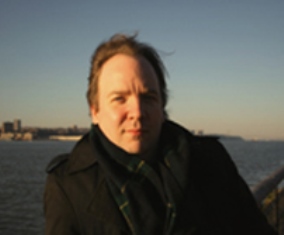
Telephoning composer Charles Coleman on Sept. 11 couldn‘t have been more appropriate.
It was Coleman’s “Streetscape,” a salute to his hometown, New York City, that opened the Cincinnati Symphony Orchestra’s 2001 season -- and with uncanny resonance, coming just three days after 911.
Coleman spent five weeks as resident composer with the CSO in 2007, during which time his symphonic work “Deep Woods” was premiered. He returns in October for the world premiere of his Violin Concerto as part of the 2013 Constella Festival.
Commissioned by the Festival, the Concerto was written for Tatiana Berman, Constella's artistic director. Berman will perform the work with a chamber orchestra led by former CSO music director Paavo Järvi. (It was Järvi who led the CSO in that post-911 concert, his inaugural as CSO music director.)
“When 911 happened and the press was making issue about when’s the next attack, I was like, ‘Oh my God, is “Streetscape” going to be my last piece, and am I going to die in the next attack?’ I had fleeting thoughts like that, but here I am, 12 years later and I’ve written a few things since.”
Coleman has lived in the same neighborhood in lower Manhattan since he was a child. “I’ve lived in the same general area for the past 30 years (Tribeca, just a few blocks from the former World Trade Center), so I wouldn’t know what to do as far as living somewhere else.”
In addition to composing, he sings professionally and occasionally teaches music appreciation courses at Greenwich House on Barrow Street. Of the latter, he said, “It’s fun to go over certain pieces by composers and look at what they went through. One of my favorites is Sibelius. After he finished ‘Finlandia,’ he discovered he had throat cancer and had an operation. He was told by his doctor that he couldn’t drink or smoke for nine years. The result was his Fourth Symphony, the darkest piece he ever wrote.” (Sibelius subsequently lived to be 91.)
An operatic baritone, Coleman sang with the Metropolitan Opera children’s chorus as a child. He made his debut at ten singing the role of Feodor with bass Martti Talvela in Mussorgsky’s “Boris Godunov.”
He continues to sing regularly, both new music concerts and in bistros such as Papillon on E. 54th St. in midtown Manhattan. Papillon has an opera night every Saturday. We were videotaped about a month ago by a TV crew for a show called ‘Born to Explore’ (a travel and culture show that airs weekly on ABC). They did a whole documentary on us.”
In restaurants, Coleman sings standard repertoire. “For professional concert gigs, I sing music by not-so-famous-living-guys, as opposed to the famous-dead-guy rep,” he said.
“New York is a melting pot of living composers. We don’t get paid a lot, but we get a lot of performances. I’ve worked with a group called Composers Concordance, which is basically a bunch of living composers, including myself. We do a series of concerts every year. I provide my own vocal music along with music by other composer friends.”
“You hope,” he said, “that it’s some kind of modern version of Fountainbleau (near Paris), where Copland and the other guys got together when they were in their twenties.”
Coleman was a co-founder with conductor Kristjan Järvi and fellow composer Gene Pritsker of Absolute, a cutting edge chamber group that has performed and recorded much of his music. “I’m still the librarian of the orchestra and a regular composer,” he said.
Though he has written various pieces involving violin solo, the Violin Concerto is his first concerto for violin, “certainly of this caliber.” He describes the 25-minute, three-movement piece as “pretty standard in terms of general form” (Samuel Barber’s Violin Concerto was an influence, he said).
“The first movement is basically a play on rhythm in which the percussion starts out with a pattern, and the solo violin kind of glides around it. As it develops, various harmonizations come out, and the violin floats like a ship amidst a river of rhythm. The second movement is slow and lyrical. I was going for something that would bring out the emotion of the listener.”
The third movement, in which he employs triplet dance rhythms, was influenced by the corresponding movement of J.S. Bach’s E Major Violin Concerto, he said. “It’s a bit more convoluted, with lots of counter rhythms going against each other. It’s like, what would happen if Bach partied too much?”
“Charles’ Violin Concerto has some great groove and swing to it, a beautiful, ethereal slow movement and a relentless momentum in the brilliant finale," said Berman. "It is very interesting to be learning it and seeing how my part fits into the overall, symphonic-sounding score.”
For his next Composers Concordance event, Coleman will sing a cycle of songs to poems written by his father, Val Coleman. Writing words is not something Coleman does himself, however. “Part of the charm of writing music is its ambiguity. I like the fact that it can apply itself to any situation because there are no words that trap it down.”
Does he have a favorite among the pieces he has written?
“Everyone asks you ‘what’s your favorite piece?’ It’s always the last one you finished,” he said.
Violinist Tatiana Berman will perform the world premiere of Charles Coleman’s Violin Concerto at 7:30 p.m. Oct. 10 in Memorial Hall. Also on the program are Stravinsky’s “Apollo” and Mozart’s Symphony No. 33, K.319. Paavo Järvi will conduct. An art exhibition will accompany the event. Tickets are $24.50-$65, available at www.constellafestival.org, or call (513) 621-ARTS (2787).
.